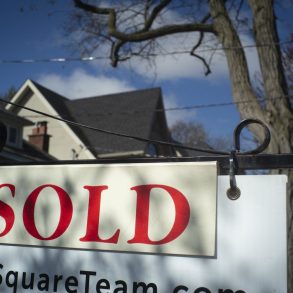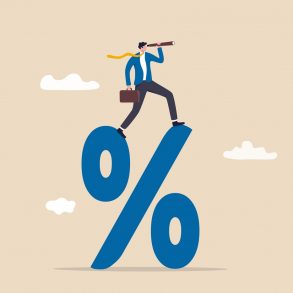Early April housing data indicates prices for certain housing segments in the Greater Toronto Area are down from their February peak by as much as 22%.
The data from HouseSigma shows a preliminary 22.6% decline in freehold townhouse prices from February to early April, while semi-detached prices are down 13.5%, detached homes are down 12.1% and condos are down 6.8%.
“Further evidence of the market slowing down can be found as the Median Aggregated Days on Market, the combined days on market for listings that have been terminated and relisted within one week, has more than doubled since February, while the number of active listings has increased by 76%,” the report noted.
While the data is very preliminary, the hardest-hit regions are Brock, which registered a 29% decline, followed by Georgina (-21%) and East Gwillimbury (-19%). Other GTA regions saw more modest declines, while Burlington still posted a 1.92% increase from February.
“The data for April is still coming in but this early data suggests that the high activity and high prices from earlier this year are beginning to stabilize, and the expectation is for a more balanced market moving forward,” the report adds.
B.C. Passes ‘Cooling-Off Period’ Bill
Bill 12, the so-called “Cooling-Off” bill, was passed by the B.C. legislature last week, though critics say it’s short on details.
The bill aims to protect B.C. homebuyers by allowing buyers a period of time where they can back out of their home purchase with no or diminished legal consequences, and will apply to both resale and newly built homes.
The problem is, the bill was passed with numerous logistical questions left unanswered. For example, there is no indication when the bill will come into effect, how long the “cooling-off” period will be, or what—if any—financial penalty a buyer would have to pay after backing out of a deal. It’s also not clear which geographical locations the bill will apply, whether it be province-wide or specifically the Greater Vancouver Area.
“A new homebuyer protection period is one part of the Province’s efforts to protect people during the home-buying process,’ reads a B.C. government release. It adds that the final parameters of the bill will be informed by the outcome of consultations with the B.C. Financial Services Authority (BCFSA), along with “a range of real estate industry stakeholders, including home inspectors, appraisers, Realtors, academics and representatives from the legal and financial services sectors.”
More non-owners are giving up on homeownership
Among Canadian non-owners, six in 10 (63%) say they have given up on ever owning a home, according to a new survey conducted for Global News.
Additionally, two in three Canadians (67%) and three quarters of non-owners (76%) feel that owning a home is now only for the rich. Those in Ontario and British Columbia, where home prices are among the highest, are most likely to agree.
“The rapid appreciation of the value of homes has created further economic disparity between those who own a home and those who don’t,” according to the report.
Interestingly, the survey also found that just four in 10 non-owners (40%) agree that the newly announced Tax-Free First Home Savings Account will help them afford a home.
Roughly half of non-owners (51%) said they would consider co-ownership with family or friends in order to afford a home.
Inflation increasing debt concerns among Canadians: CIBC survey
While the majority of Canadians with debt are comfortable with their financial situation, a growing percentage say they are concerned about rising inflation.
A new CIBC survey has found that less than a third of Canadians are debt-free, and that 71% of those with debt are comfortable with their financial situation.
Much of that comfort, however, hinges on the full impact of inflation. Almost three-quarters (68%) of those with debt say they are concerned or “very” concerned about the impact of inflation on their ability to pay their bills. Further interest rate increases would cause 44% to be concerned about their ability to make regular payments, the survey found.
Excluding mortgage debt, over half (51%) of those with debt expect to be debt-free in the next five years, while a majority of those with mortgages expect to be mortgage-free by age 55.
The survey also found that among those with mortgage debt, the mortgage accounts for 84.7% of their total debt, on average.
Rapid rate hikes needed to quell inflation expectations: former BoC head Dodge
Canada’s policy rate needs to rise quickly in order to keep inflation expectations under control.
That’s according to one of the country’s most-experienced authorities on the matter, former Bank of Canada Governor David Dodge, who served in that role from 2001 through the financial crisis to 2008.
“The issue for central banks is very much that they need to be careful not to let the expectations genie out of the bottle … which we didn’t do in the 1970s,” he said in an interview with the Globe and Mail.
The current Governing Council needs to get its policy rate higher, and “get that up quickly, to break expectations as quickly as possible – certainly by the summer,” he said.
Dodge said the Bank needs to hike its policy rate by 50 basis points, or potentially 75 bps, at its upcoming meeting in June, “followed by another 50 or so” in its subsequent meeting in July.
This follows remarks made by current BoC head Tiff Macklem, who last week said that the Bank may need to hike rates by 50 bps to tackle inflation.
Dodge noted that the pandemic and the current recovery could pose a unique set of challenges for the central bank, unlike anything seen in prior years. “I think we have to be prepared to be thinking about a world that is more supply-constrained than we were used to in the first 19 years of this century,” he said.
Equitable Bank named top schedule 1 bank in Canada
Mortgage lender Equitable Bank has been named the top schedule 1 bank in Canada and among the world’s best, according to the Forbes list of World’s Best Banks 2022.
The list was based on over 45,000 consumer surveys from 27 different counties, where participants were asked to rank every bank at which they have a chequing or savings account.
“Being recognized by our own customers in this way is really gratifying and a proof point that we are on the right track in building a modern digital bank,” said Andrew Moor, President and CEO of Equitable Bank.
Equitable Bank, nicknamed Canada’s “Challenger Bank,” boasts $7 billion in deposits and over 250,000 customers.







